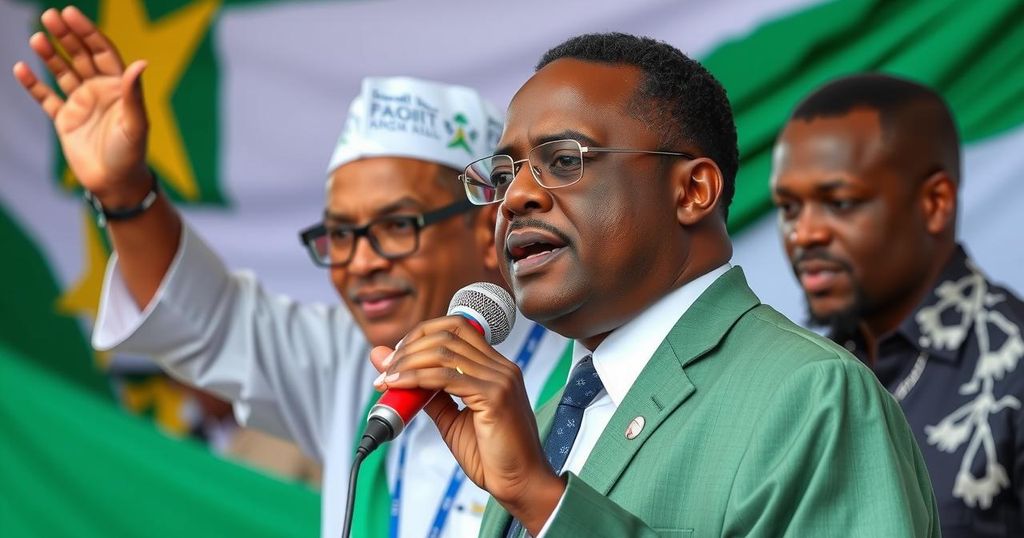World news
2024 ELECTIONS, AFRICA, AP, ASSOUMANI, AZ, AZALI ASSOUMANI, COMO, COMOROS, CONVENTION FOR THE RENEWAL OF THE COMOROS, CRC, DIPLOMATIC RELATIONS, ELECTIONS, ELECTORAL COMMISSION, EUROPE, FRANCE, GOVERNMENT, INDIAN OCEAN, ITALY, MADAGASCAR, MORONI, PRIME MINISTER APPOINTMENT, SUPREME COURT, VOTER TURNOUT
Daniel O'Connor
0 Comments
Comoros Ruling Party Secures Majority in Parliamentary Election
In the Comoros parliamentary election, the ruling Convention for the Renewal of the Comoros party won 28 out of 33 seats, retaining its majority. The election was boycotted by some opposition parties due to allegations of electoral fraud. The results await confirmation by the Supreme Court, amidst concerns about the future of democratic governance in the nation.
In a recent electoral outcome in the Comoros, the ruling party, the Convention for the Renewal of the Comoros (CRC), has secured 28 out of 33 parliamentary seats, as revealed by the electoral commission on Tuesday. This result allows President Azali Assoumani’s party to maintain its governing majority within the nation. The election, which took place on Sunday, saw participation from the ruling party, though several opposition factions chose to boycott the event, alleging historical electoral malpractice by the CRC. The results are pending confirmation by the Supreme Court.
The Comoros, located in the Indian Ocean composed of three islands near Madagascar, has a tumultuous political history, marked by a series of military coups following its independence from France in 1975. President Azali Assoumani, a former military officer, initially seized control of the state in 1999 through a coup d’état against the sitting president. Although he temporarily stepped down in 2006, he returned to power in 2016 and has since won three consecutive elections. In 2018, he enacted constitutional amendments that enabled him to bypass term limits as part of an agreement that previously mandated the alternating presidency among the islands.
The political landscape of Comoros has been fraught with instability, particularly due to allegations of electoral fraud and undemocratic practices by the ruling party. The ongoing control of the CRC indicates a consolidation of power under President Assoumani, which raises concerns among opposition parties about the future of democratic governance in the archipelago. Given the historical context that includes military intervention in governance, these recent events suggest a continuation of contentious political dynamics within the Comoros.
The electoral commission has stated that these preliminary results are subject to further examination by the nation’s Supreme Court, which is a standard protocol for ensuring the legitimacy of the electoral outcome. Opposition parties have expressed skepticism about the fairness of the electoral process, reiterating claims of previous electoral malpractices. The situation in the Comoros remains critical as stakeholders await the final verdict on the parliamentary elections, which carry significant implications for the political future of the islands.
The Comoros is an archipelago located off the eastern coast of Africa, near Madagascar. Since gaining independence from France in 1975, the islands have been plagued by political instability, primarily due to a series of military coups that have shaped their governance. President Azali Assoumani, a pivotal figure in Comoros politics, first rose to prominence in 1999 after leading a coup. His repeated terms in power have been marked by controversy, particularly regarding his alterations to constitutional frameworks allowing extended presidential terms. This backdrop provides a critical understanding of the current electoral dynamics.
The recent parliamentary election results in Comoros reflect a consolidation of power by the ruling CRC party, securing a significant majority of seats. As the political landscape continues to evolve amidst allegations of electoral misconduct and a lack of opposition participation, the implications of this election underscore the fragility of democratic processes in this island nation. The next steps, including Supreme Court confirmation, will be crucial for determining the legitimacy of the new parliamentary composition and addressing the concerns raised by opposition factions.
Original Source: www.seattletimes.com




Post Comment